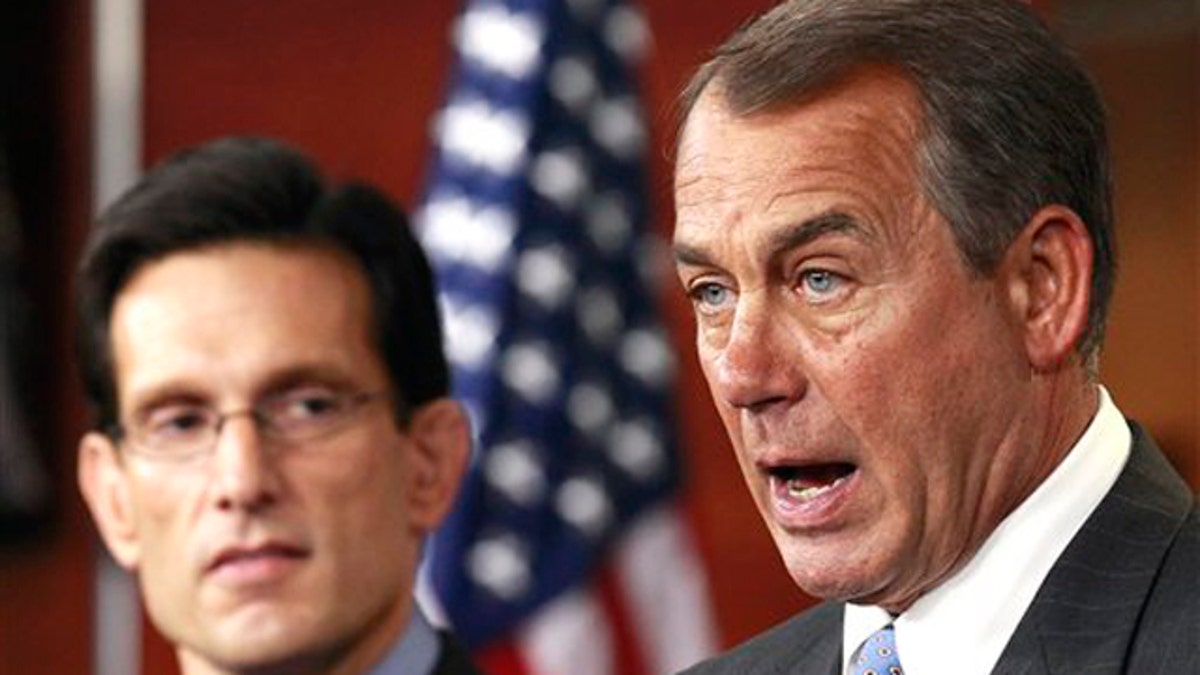
Jan. 6: House Speaker John Boehner, right, accompanied by House Majority Leader Eric Cantor, speaks to the media on Capitol Hill. (AP)
The principal budget scorekeeper on Capitol Hill estimated Thursday that repealing the health care overhaul could add about $230 billion to the federal deficit over the next 10 years, while acknowledging the figure is a rough estimate.
The Congressional Budget Office released the projection as the new Republican House majority prepared to take up a repeal as one of its first orders of business in the 112th Congress. House Republican leaders announced their own report Thursday morning, claiming the health care law as it stands will destroy jobs, and arguing that the repeal would cut spending and grow the economy.
House Speaker John Boehner rejected the CBO's findings outright.
"CBO is entitled to their opinion," he said, adding that the agency responsible for pricing out the price of legislation based the health care law's cost on flawed data.
"I do not believe that repealing the job-killing health care law will increase the deficit," he said. "CBO can only provide a score based on the assumptions that are given to them."
Rep. Fred Upton, R-Mich., chairman of the House Energy Committee, said the savings claimed by the administration in the health care law aren't even believed by the head of the Medicare program.
"Despite the administration's billion-dollar taxpayer- funded ad campaign to convince seniors otherwise, the $575 billion in cuts to Medicare to fund new entitlements will hurt the Medicare program and its beneficiaries," Upton said during a hearing on the rules regarding debate of the repeal bill.
"The administration's chief actuary estimates that a full 50 percent of participants, or 7 million seniors, will lose access to their Medicare Advantage plans. The bill cuts hundreds of billions from Medicare providers that, according to the actuary, could force 15 percent of providers to leave the program. ... The administration's chief actuary predicts that the federal government and the country will spend $310 billion more under Obamacare than we would have without the new law," Upton said.
But Democrats, campaigning hard against the reversal, immediately held up the latest CBO figures as proof that the health care repeal is a budget-buster and claimed Republicans will end up breaking their pledge to cut spending with the repeal vote -- since the CBO estimated last year that the law reduces the deficit.
"The GOP plan explodes the deficit and will have a devastating impact on the health of millions of Americans," House Democratic Leader Nancy Pelosi's office said in an e-mail.
Senate Democrats immediately called a hearing for later this month to discuss the benefits of the new law, which they cite as deficit reduction, protection from insurance company abuses, coverage for people with pre-existing conditions, continuous coverage for people switching jobs, reductions in waste, fraud and abuse and coverage until age 26 for young adults on their parents' plans.
"While the Congressional Republicans seem dead-set on reopening old arguments, Democrats are focused on swiftly and efficiently implementing health reform so that its advantages will be enjoyed by all Americans," said Sen. Tom Harkin, R-Iowa, chairman of the Senate Health, Education, Labor and Pensions Committee.
According to the CBO estimate, repealing the health care law would add $230 billion to the deficit from 2012-2021. On a 2012-2019 timeline, that figure is about $145 billion.
The CBO noted that the amount the law was projected to save will not be exactly the same as the cost of repealing it due to changes in economic projections and other factors. But the office nevertheless estimated a significant impact on the deficit -- since the law originally called for Medicare payment reductions, taxes on high-premium health insurance plans and other offsets.
Click here to read the CBO letter to Boehner.
It also acknowledged that the "score" is filled with uncertainty for other reasons.
"The projections of the bill's budgetary impact are quite uncertain , both because CBO has not completed a detailed estimate of the effects of H.R. 2 and because assessing the effects of making broad changes in the nation’s health care and health insurance systems -- or of reversing scheduled changes -- requires assumptions about a broad array of technical, behavioral, and economic factors," reads the letter from CBO Director Doug Elmendorf.
"As a result, CBO believes that its estimates of the net budgetary effects of health care legislation have a roughly equal chance of turning out to be too high or too low," the letter continues.
The CBO estimated that 32 million fewer people would have health insurance by the end of the decade if the law is repealed. The CBO said premiums would be lower, but "many people" would still be paying more since they would not be receiving government subsidies, which are provided under the health care law.
"To repeal the entire health care bill in week one means that you're adding hundreds of billions of dollars in debt and deficit," Rep. Steve Israel, D-N.Y., chairman of the Democratic Congressional Campaign Committee, told Fox News.
Boehner responded that Republicans don't just want to repeal the health care law. They want to replace it with "common-sense reforms," which he claims will lower health care costs.
"Obviously we want to ensure that every single American has access to quality health insurance and health care," added Rep. David Dreier, R-Calif., chairman of the Rules Committee.
The GOP-led effort to repeal the law is seen as largely symbolic as long as President Obama is in the White House. Even if the Democrat-dominated Senate managed to approve the repeal along with the House, Congress would still need to come up with a two-thirds majority to override the inevitable veto by the president.




